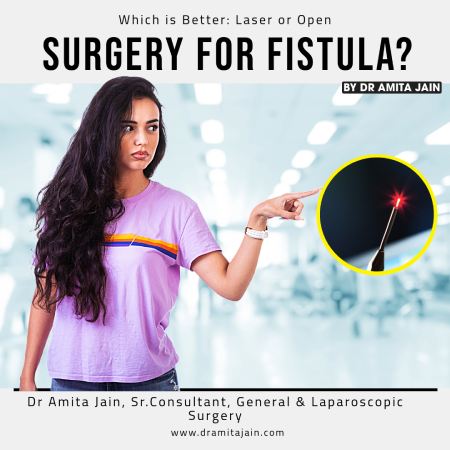Fistulas, abnormal connections between organs or between an organ and the skin, require surgical intervention for treatment. Two primary surgical approaches are commonly considered: laser surgery and open surgery. Each method has its own set of advantages and limitations, which must be carefully evaluated to determine the most appropriate treatment option for each patient.
Understanding Open Surgery: Open surgery, also known as conventional surgery, involves making a traditional incision to access and repair the fistula. This approach provides direct visualization of the affected area, allowing for thorough examination and treatment of associated complications such as abscesses or scar tissue. The fistula tract is typically excised, and surrounding tissues are repaired to promote healing and prevent recurrence, says Dr Amita Jain, the leading surgeon for fistula in Delhi.
What are the Advantages of Open Surgery?
Advantages include:
- Direct visualization: Surgeons have a clear view of the fistula and surrounding tissues, enabling precise treatment.
- Comprehensive repair: Open surgery allows for thorough removal of the fistula tract and repair of associated complications.
- Established technique: Open surgery has been widely used for fistula treatment and is familiar to many surgeons, reducing the risk of technical errors.
What are the Limitations of Open Surgery?
Limitations include the following:
- Longer recovery times: Patients undergoing open surgery may experience extended recovery periods due to the larger incision and tissue trauma.
- Increased pain: The invasiveness of open surgery can result in higher levels of postoperative pain and discomfort.
- Higher risk of complications: Open surgery carries a greater risk of complications such as infection, bleeding, or wound breakdown.
Exploring Laser Surgery: Laser surgery, or minimally invasive surgery, offers a less invasive alternative for treating fistulas. Instead of a large incision, specialized equipment such as a laser fiber is used to precisely target and seal off the abnormal passageway. This approach is often performed under local anesthesia or sedation and may result in reduced postoperative pain, scarring, and faster recovery.
What are the Advantages of Laser Surgery?
Some of the advantages are:
- Minimally invasive: Laser surgery involves smaller incisions, reducing tissue trauma and promoting faster healing.
- Reduced postoperative discomfort: Patients undergoing laser surgery may experience less pain and discomfort compared to open surgery.
- Precise treatment: Laser technology allows for precise targeting and sealing of the fistula tract, minimizing damage to surrounding tissues.
What are the Limitations of Laser Surgery?
Some of the limitations are:
- Not suitable for all cases: Laser surgery may not be appropriate for complex or recurrent fistulas that require extensive treatment.
- Risk of complications: While generally safe, laser surgery carries a risk of complications such as bleeding, infection, or recurrence.
- Limited availability: Laser surgery may not be readily available in all healthcare facilities, limiting access for some patients.
Both laser and open surgery are viable options for treating fistulas, each with its own set of advantages and considerations. While open surgery allows for direct visualization and comprehensive repair, laser surgery offers a minimally invasive alternative with potentially faster recovery times and reduced postoperative discomfort.
The choice between the two approaches depends on individual patient characteristics, preferences, and the expertise of the surgical team. By carefully evaluating the benefits and risks of each option, healthcare providers can tailor treatment plans to meet the unique needs of each patient and achieve the best possible outcomes.

Dr Amita Jain is a surgeon with the highest degree of professional competence, precision and surgical craftsmanship. Performed all complicated general surgery procedures with in depth knowledge of invasive and few minimal invasive and onco surgical techniques. Underwent special training in trauma, executed various trauma-related complex life-saving neurosurgical procedures, reconstructed injured mangled limbs and performed vascular and reconstructive procedures with critical care.
Dr Amita Jain holds 28 plus years of rich experience in Trauma and General Laparoscopic Surgeries (including Gallbladder stone removal, appendix removal, hernia repair surgery, piles and fissure surgeries). She was the Professor Surgery of at the Army College of Medical Sciences and Base Hospital Delhi Cantt. In 1994 she was commissioned as Surgeon under the United Nations Mission in Congo. From 2020 to 2022, she worked with Bansals Hospital. Currently, Dr Amita Jain is the Sr. General and Laparoscopic Surgeon at Rainbow Children Hospitals, Malviya Nagar, Delhi.

